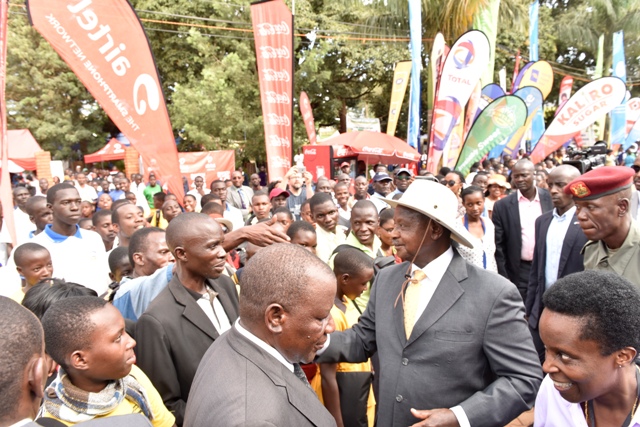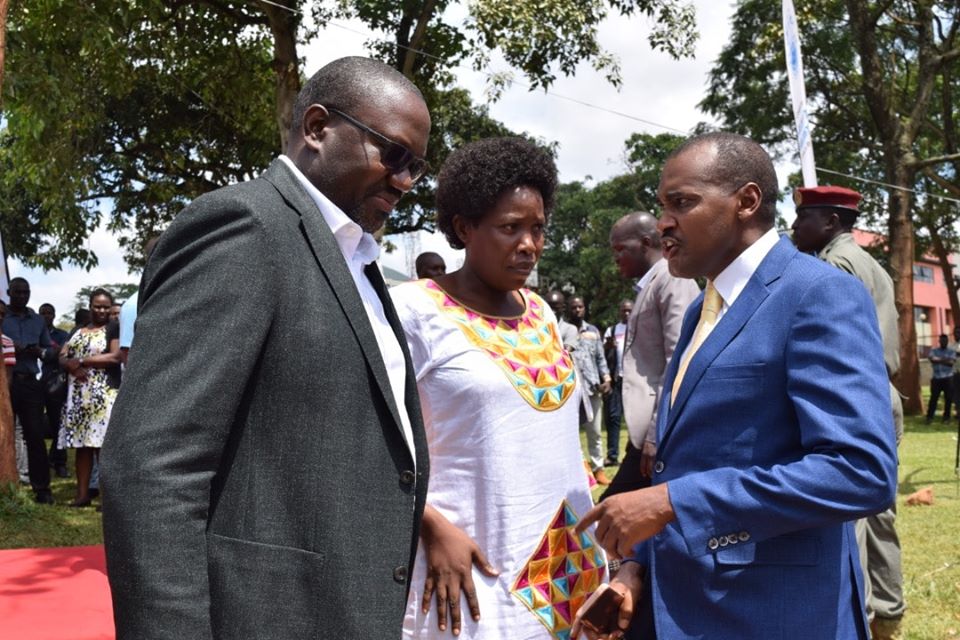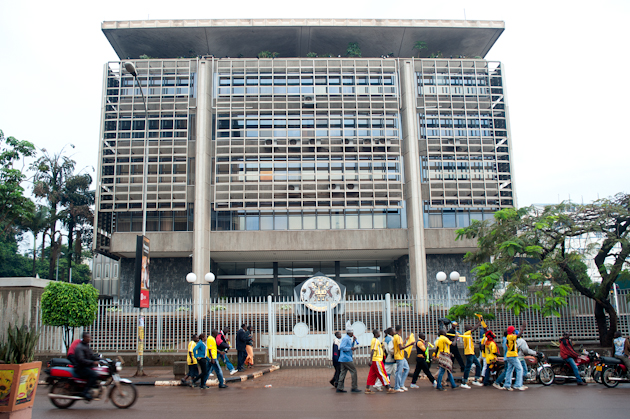The year 2019 had its good and bad in as far as the business side of the Ugandan economy was concerned. Many business events and news happened, creating public debate in sectors like banking, oil & gas, aviation, industry, energy, services, ICT, trade, hospitality, tourism and agriculture, to name but a few. Eagle Online brings readers a recap of some of the key business news that dominated the local media.
Uganda Airlines back in skies after 20 years of inactivity

Uganda Airlines once again flew to the skies above Africa, restoring its status as the country’s national carrier after nearly 20 years of slumber due to poor revenues. Commercial services resumed on August 27, 2019 with a flight from Entebbe to Nairobi in neighbouring Kenya that the airline hoped will usher in a profitable new era for the formerly debt-ridden company. The company’s fleet of twin-engined Bombardier CRJ-900 regional jet have had destinations to Dar-es-Salaam in Tanzania, Mogadishu in Somalia and Mombasa and Zanzibar.
Tullow farm-down terminated as deadline for negotiations expires

In August 2019, Tullow announced that this farm-down was terminated, following the expiry of the Sale and Purchase Agreements (SPAs). The termination of the transaction was a result of being unable to agree all aspects of the tax treatment of the transaction with the Government of Uganda.
Tullow has now initiated a new sales process to reduce its 33.33% Operated stake in the Lake Albert project.
In January 2017, Tullow announced that it had agreed a substantial farm-down of its assets in Uganda to Total. Under the Sale and Purchase Agreement, Tullow agreed to transfer 21.57% of its 33.33% interest in Exploration Areas 1, 1A, 2 and 3A in Uganda to Total for a total consideration of US$900 million. CNOOC Uganda Limited (CNOOC) subsequently exercised its pre-emption rights under the joint operating agreements to acquire 50% of the interests being transferred to Total on the same terms and conditions.
Joint Venture Partners Total and CNOOC pull out EACOP

In September Total and CNOOC pulled out of the planned construction of US$3.5 billion East African Crude Oil Pipeline (EACOP). This followed failure by the Joint Venture Partners (JVPs) and the government to agree on the tax treatment of the transaction.
Subsequently, Total indicated the suspension of activities on EACOP project supposed to transport crude oil from the export hub in Hoima in Uganda to the port of Tanga in Tanzania.
Ministry of Energy officials admitted that Tullow’s action affected contractors and sub-contractors whose services are equally suspended. The developments affected the taking of the Final Investment Decision (FID) for the Tilenga and Kingfisher Projects (Upstream) and EACOP Project which was expected in the course of this year. Reports indicate government has identified some other companies interested in EACOP.
First UNOC CEO resigns under unclear circumstances

Dr. Josephine Wapakabulo on May 13, 2019 resigned her position as Chief Executive Officer (CEO) of the Uganda National Oil Company (UNOC), three years into the job.
Dr. Wapakabulo in a surprise resignation letter sent to UNOC Chairman, Dr. Emmanuel Katongole said she would leave the organisation effective August 31, 2019 to focus on family and new opportunities.
“Chairman, it has been an honour to work with you, the Board and the entire staff of UNOC as we set up the company to handle the state’s commercial interests in the Oil & Gas sector. I am proud of the work we have done. However time has come for me to focus on my family and other opportunities,” she wrote in her resignation.
Dr. Wapakhabulo was replaced by Proscovia Nabbanja who had been serving as UNOC’s Chief Operating Officer – Upstream.
Bank of Uganda currency scandals tarnish institution’s image

In August police and army officer arrested three staff of Bank of Uganda (BoU) in Mbale who were reported smuggling old currency in sacks which was against BoU regulations. Eagle Online was told then that a combined team of security operatives from police, intelligence and military stormed the currency centre after a tip off from an internal staff who said it had become a norm for money which
In June, this year a source who whose firm is hired by BoU headquarters told Eagle Online that his staff whose was among those hired to offer cleaning services was expelled from BoU headquarters after he questioned why money was mixed with rubbish.
In June State House Anti-Corruption Unit (ACU) and police arrested several BoU officials in charge of currency. In June, this website broke a story on how State House, police and other agencies were investigating BoU over the extra Shs90 billion that was printed separately and shipped into the country without the knowledge of the governor Emmanuel Tumusiime Mutebile. It later on turned out that it is indeed Mutebile himself who had petitioned Lt. Col. Edith Nakalema to investigate the scandal of extra printing of money.
The director of Currency department at Bank of Uganda, Charles Malinga was arrested and arraigned before Anti-Corruption Court in Kololo over the extra printing of money before his appearance, Francis Kakeeto, a branch manager at Mbale and Fred Wanyama were charged with abuse of office and in alternative corruption which they have both denied before Magistrate Herbert Asiimwe.
Prosecution informed court that on April 26, 2019 between France, Belgium and Entebbe airport, the duo while on assignment by their employer to carry out a pre-shipment inspection of printed materials in France, in abuse of the authority to offices did an arbitrary act prejudicial to the interest of their employer and allowed the inclusion of unauthorized case on a cargo plane fully chartered by BoU.
Hardly a month after, Uganda Police detectives were reported to be investigating Shs400 billion that the Bank of Uganda (BoU) officials transferred and stored in BoU Masaka Currency Centre in a room without CCTV cameras, meaning the money could be stolen without tracing it.
The huge money is said to have been transferred to Masaka on June 14, 2019, the time when investigators started probing BoU and other officials over the anomaly in the consignment of the 20 pallets packed with Uganda Shillings notes that were delivered at Entebbe International Airport by BoU chartered plane on April 26, even though, extra 5 pallets were onboard and their whereabouts is unknown.
Bank of Uganda has eight currency centres across the country. And to stem out stealing of notes by staff, BoU would later issue stringent rules related to accessing currency departments and units.
COSASE probe report urges BoU’s Mutebile and Kasekende be removed from board

In late February, the report of parliament’s Committee on Commissions, Statutory Authorities and State Enterprises (COSASE) on Auditor General’s special audit report on the closure of seven commercial banks in Uganda urged that the Bank of Uganda (BoU) Governor Emmanuel Tumusiime-Mutebile and his deputy Dr Louis Kasekende be sacked from the Central Bank’s Board of Directors if the institution is to run its operations efficiently in the future.
MPs on COSASE made the recommendation in their report to parliament following the probe of BoU on the irregular closure of seven banks such as; Teefe Trust Bank, Greenland Bank, International Credit Bank, Cooperative Bank, National Bank of Commerce, Global Trust Bank Uganda and Crane Bank Limited. The banks were controversially closed between 1993 and October 2016.
The MPs in their report said that much as Article 161 (4), provides that the Governor and deputy Governor shall be Chairperson and Vice Chairperson respectively, good governance principles would require that the position of the Chairperson and Vice Chairperson of the board is separated from the position of the Chief Executive Officer. “It is the recommendation of this committee (COSASE) therefore, that Article 161 (4) be reviewed to separate the offices the leadership of the Board and top management of BoU,” the report partly said.
The MPs say the separations of the two positions is a good practice which can help achieve an appropriate balance, increase accountability and improve the board and capacity of decision making and independent management. Interestingly Tumusiime-Mutebile and Kasekende still sit on BoU board as Chairman and Vice Chairman.
Court dismisses Crane Bank In Receivership case against Sudhir

In August, Kampala businessman Sudhir Ruparelia and his Meera Investments Limited won a case in after BoU/Crane Bank in receivership sued them on allegations of fleecing Shs397 billion.
Commercial Court Judge, Justice David Wangutusi, dismissed the case, agreeing with the submissions of Sudhir’s lawyers and ordered that BoU pays costs of the suit.
During the hearing, Joseph Matsiko, one of Mr Ruparelia’s lawyers, argued that on October 20, 2016, Bank of Uganda (BoU) took over the management of Crane Bank pursuant to Sections 87 (3) and 88 (1) a & (b) of the Financial Institutions Act and that on January 20, 2018, BoU placed it under receivership. “The suit was filed on the 30th day of June 2017 when Crane Bank Ltd was in receivership. The issue, therefore, is whether a suit can be filed by a financial institution in receivership, Matsiko submitted.
He further argued that the Supreme Court has since ruled in a similar case that it would be wrong for any court to confer the right to sue when Parliament did not find it necessary to do so.
Mr Ruparelia, in an affidavit, also contended that under Uganda’s Constitution and the Land Act, Crane Bank in receivership could not own or hold freehold property and was, therefore, not capable of holding the suit property in its names.
Dr Joseph Byamugisha, who represented Crane Bank in receivership, had argued that when a financial institution is placed under receivership, it does not lose powers to commence or continue with lawsuits.
Sudhir was happy with the ruling saying that what the judged ruled on what was not new since parliaments’ committee on Commissions State Authorities and State Enterprises (COSASE) had faulted BoU on giving CBL freely to its rival DFCU Bank and has been making huge profits as a result of the acquisition.
On June 30, 2017, BoU filed a suit against Sudhir and his Meera Investments Limited, which the businessman says was in breach of clause 12 of the Confidential Settlement and Release Agreement (CSRA) that was reached by both parties after BoU closed and liquidated CBL for allegedly being undercapitalized.
The clause stipulates that, “Without prejudice to the immediate forging should any legal or administrative proceeding of any kind ensue against SR [Sudhir Ruparelia] as defined in the agreement, the agreement stands voided and BoU shall immediately return to SR the value of the settlement.”
Court throws out Sebalu & Lule Advocates out of Ruparelia Group cases

The High Court on April 29, 2019 put a permanent injunction on law firm Lule & Sebalu Advocates meaning the firm cannot now participate in cases involving the Ruparelia Group of Companies since the law firm at one time was employed by the company.
The High Court made the ruled on the case in which city tycoon Sudhir Ruparelia was seeking that Sebalu & Lule Advocates be declared conflicted, and therefore unfit to represent the parties in a longstanding commercial dispute between Dfcu bank with Uganda’s richest man.
The ruling was delivered by Justice Paul Gadenya Wolimbwa. Ruparelia also wanted the court to issue a permanent injunction, restraining Sebalu & Lule Advocates from appearing as defence counsel for Dfcu Bank in the other court case that the two principals are battling out.
UBA holds bankers’ conference to boost agriculture financing
Uganda Bankers Association (UBA) held the Annual Bankers Conference under the theme “De-risking the financing & investment in agriculture to promote youth employment and inclusive growth”. The one-day conference took place on July 16, 2019 at Kampala Serena Conference Center.
The conference aimed at facilitating a focused discussion among key players & stakeholders around making financing of agriculture attractive to financial service providers, leveraging on several perspectives for mitigating risk including market incentives, technology, insurance, research, specific policy frameworks & a wider support & collaborative framework to ensure sustainable growth & investment in the agriculture sector of Uganda.
Despite its relative importance, agriculture only attracts 12.5 percent of the total credit from formal financial institutions compared to 35.8 and 51.7 percent advanced to industry and services respectively, it was said. The conference therefore aimed at encouraging financial institutions and investors to further develop agriculture credit risk mitigants, to support increased funding towards sustainable agriculture & value chains therein. UBA has a membership of over 20 commercial banks.
UMA holds Uganda Trade Expo to showcase products and services

Uganda Manufacturers Association (UMA) in October 2019, held UGANDA TRADE EXPO, a well-established multi-sector trade event that has provided a unique platform for marketing products and services. The 27th edition of the expo, just like those in the past, enabled participants from overseas to introduce new and improved technologies on the Ugandan and East African markets. The expo featured items like machine & garden tools, home furnishings & home textiles, architecture & designing, real estate agents, and household services industries. About 800 exhibitors and 60,000 visitors were registered at the UMA Show Grounds in Lugogo, Kampala. The next edition of the expo is likely in October 2020.
Finance Minister reads Shs40.5 trn budget as more money goes to infrastructure

The Minister of Finance and Economic Planning, Matia Kasaija, on June 13, 2019, presented to Parliament Shs40.5 trillion budget for 2019/2020 financial year revealing that Uganda would finance 74.5% of the budget national development. The budget was presented under the theme, ‘Industrialisation for Job Creation and Shared Prosperity’.
Kasaija revealed that Uganda Revenue Authority would collect Shs.18 trillion out of which Shs.14 trillion would be raised from non-tax revenue, Shs445 billion from the Petroleum Fund, Shs201 billion from local governments, Shs8.5 trillion from domestic borrowing while Shs10 trillion will be from external financing.
The Ministry of Works and Transport took a lion’s share of Shs6.4 trillion, that of Defence and Security Shs3.6 trillion, Education and Sports Shs3.4 trillion, Energy and Minerals Shs3 trillion, Health Shs2.6 trillion, Local Government Shs2.8 trillion and Agriculture, Animal Industry and Fisheries Shs1.556 trillion.
Kasaija reported that the economy performed well in the previous financial year registering a growth of 6.2 percent despite challenges like unemployment, income inequalities especially between the urban and rural communities, malnutrition and unhealthy life, among others.
In his address to Parliament shortly after the budget was presented, President Museveni strongly appealed to all leaders: political, religious, cultural and civic, to use their proximity to the population and educate them on how to work and create wealth.
He said leaders needed to clearly educate the masses that modern life had raised new demands that require people to have money and that there was not place in the world for anyone living outside the money economy.
The 2020/2021 budget whose framework of about Shs35 trillion is already in circulation is likely to be ready in June 2020.
Museveni commissions controversial 183 MW Isimba hydropower dam

On March 21, 2019, President Yoweri Museveni commissioned Isimba Hydropower dam, one of the most important hydropower projects that the Ugandan Government has embarked on, to ease power shortages in the country and accelerate the development of the local economy.
The 183MW Isimba Hydropower project is 4km downstream of Isimba Falls on the River Nile and about 50km downstream from the source of the Nile. The project site is about 21km from Kayunga, the nearest town and about 65km from Jinja town.
Isimba was expected to generate hydroelectric power at 68 cents per kilowatt, the lowest in East Africa. Main features Isimba dam, which cost US$568m (about sh2.1 trillion), was financed by a loan from China Export-Import Bank (85 percent funding), while the Uganda government contributed 15 percent. Isimba hydropower plant was expected to boost the electricity generation with 183MW, pushing the country’s electricity generation to 1,158MW. However, reports say the completion of the whole project is not yet over as Shs24 billion for the construction of the bridge over the dam is said to have been swindled without trace.
In January, Museveni launched the 20MW Kabulasoke Solar Power Plant pushing electricity generation from 955MW to 975MW.
Museveni launches inaugural ICT Expo, pledges more financial support

President Yoweri Kaguta Museveni on December 17, 2019 officially launched the ICT Innovations Expo 2019 at Uganda Institute of Communication and Technology, Nakawa . He pledged to support local innovators by pouring more money in the sector he said is one of the sectors where job creation and wealth creation can be realised.
Museveni said the country would stop importing ICT solutions that can be made from within, after it emerged that Uganda spends about Shs50 billion annually on ICT imports. “Technology is no longer a choice but a necessity, I would, therefore, like to assure Ugandans that we will work towards eliminating import solutions in the ICT sector, such money should be diverted to local innovators,” he said.
The expo was organised by the Ministry of ICT & National Guidance (MoICT & NG) which is the overall government institution responsible for all matters of policy, laws, regulations and strategy for the ICT sector in Uganda.
The outgoing ICT Minister Frank Tumwebaze advocated for more funding of the local ICT innovators but also stressed the importance of ICT in fighting corruption in the country. “Why should people line up for passports, search for land titles or obtain a permit? Why not take it online for efficiency? The more you automate, the more you reduce human contact hence addressing corruption,” he said, he said procurement process in the country should be automated, a suggestion Museveni said he would enforce.
The above business events and news made headlines in 2019 and Eagle Online expect more to emerge in 2020 especially in the areas of oil and gas, energy, transport and works.
Commercial sugarcane grower Aliira wins Shs30m in NSSF Friends with Benefits Season 3

Commercial sugarcane grower, Simon Aliira won of Shs30 million prize in the 2019 National Social Security Fund (NSSF) Friends with Benefits Season 3 (NSSFWB3). Aliira worked for Kinyara Sugar Works Limited from 1993 to 2012 and retired into sugarcane plantation farming in Kinyara, Masindi district after he received Shs85 million as his NSSF retirement benefits in 2013. His business has gone to create jobs for those within his community.
Martin Owako was first runner- up used his NSSF benefits to set up a poultry farm, re-invest in his rental property as well as launch a successful tour and travel company.
Edson Mwine was the second runner- up and walked away with Shs 10 million. He used his NSSF Exempted Benefit of less than Shs 700,000 to start a welding business.
Sarah Mubiru walked away with a cheque of Shs 5 million having emerged as the Judges’ choice for NSSFFWB3. Sarah used her NSSF Withdrawal Benefit to make honey made sweets.
NSSFFWB campaign, now in its third year, is a TV show designed to encourage a savings culture in Uganda as well impart financial literacy among savers, by showcasing stories of NSSF beneficiaries who received their savings and did something lie changing.
The show profiles former NSSF members who received and invested or used their NSSF benefits to improve their lives, those of their families and even the communities they live in.
NSSF unveils high-end apartments to Ugandan market with promise to build more

In December NSSF unveiled ‘The Citadel Place, Mbuya’ which, comprises of 40 high-end apartments each with a gross area of 170 square metres, served by amenities including a swimming pool, fully equipped gym, a club house and 24-hour CCTV surveillance.
NSSF Managing Director Richard Byarugaba said that the Fund in partnership with the government of Uganda aim to construct offices for selected ministries and government agencies. Under the partnership, the Fund will develop the campus and then transfer to after completion.
Byarugaba shared that the Fund remained committed to supporting the government efforts to provide the best and most competitive retirement benefits to fellow Ugandans.
The Chairman Board of Directors NSSF, Patrick Kaberenge in his remarks during the launch of The Citadel Place, said that “The Citadel Place is a testament that the market for real estate products exists in Uganda.”
Minister of State for General Duties, Gabriel Ajedu in his speech at the launch of The Citadel said that, “It gives Government pleasure to see the Fund growing in leaps and bounds – now worth about 11.5 trillion shillings in Assets under Management.”
Umeme sources Shs258b loan for grid expansion

Uganda’s electricity distributor Umeme Limited secured US$70 million (about Shs258 billion) in a syndicated loan to finance infrastructure upgrades and national grid expansion. The loan secured in December was agreed with the World Bank’s private lending arm International Finance Corporation (IFC), South Africa’s Standard Bank and Dutch development bank FMO.
Company officials said investments will be carried out within three years and will involve revamping sections of the distribution network, increasing grid connections and boosting supply reliability. “This financing will enable us to mobilise and deploy the much-needed long-term capital expenditure urgently needed to evacuate the new generated power,” the company said in a statement.
Uganda’s national electricity grid currently reaches just 26 percent of the nation’s 44 million people. When Karuma is operational, Uganda’s total power generation is expected to hit nearly 2000MW. Umeme said the funding will also help it connect more of its customers to prepaid meters, a strategy it began rolling out in 2011 to help cut rampant customer defaults and power thefts.
Gov’t moves to introduce 980 buses to ease traffic flow in Kampala

Government is planning to introduce 980 buses to ease traffic and congestion in Kampala and surrounding areas. Code named, Tondeka Metro buses are expected to start operating before the end of 2020. The busses will operate 24 hours a day and 7 days a week on a cashless mode of transaction which will be managed by Hinduja Group, the manufacturers of the Leyland brand. They will avail services in a radius of 25KM in and around Kampala on specified routes of Kampala-Mukono on Jinja Road, Kampala- Nsangi on Masaka Road, Kampala- Buloba on Mityana Road, Kampala- Wakiso on Hoima Road , Kampala-Matugga on Bombo Road; Kampala – Entebbe and Kampala- Ggaba.







